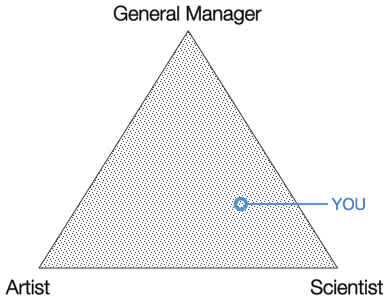Your product career: Growing with intention
“Where do you see yourself in 10 years?” Chances are, you’ve been asked this question by a manager at some point in your career.
Here’s the thing about this question that no one tells you: Almost everyone struggles with the answer.
Here’s another: It’s okay not to have an answer.
In this context, the important thing is that you take the time and space to evaluate your career so far, acknowledging your preferences and identifying what drives you, in order to make thoughtful decisions going forward.
Fullstory’s Head of Product Evan Michner tackled this ambiguity around career development in a recent webinar for product professionals—whether established PMs or those just getting started in the practice.
In his session, Evan breaks career development and evaluation down into two parts:
Part 1: Build a career rubric for yourself based on a few key themes and questions.
Part 2: Use that rubric to think through two big questions that product managers typically face in their careers:
Should I pursue people management?
How should I evaluate career opportunities and companies?
Let’s dive in.
Part 1: Build your personalized rubric
This rubric is designed to help you figure out what you should look for in your next role or company. It will guide you through the process of taking stock of your experiences so far, documenting what you’ve learned about your work style and preferences, and creating an outline of the characteristics your ideal role/workplace would have.
You don’t necessarily need to be facing a major decision to build your product career rubric—this five-part framework is useful at all points in your career journey. Whether you’re considering a shift or simply taking stock, this introspective exercise will help you understand what makes you tick as a product person.
There are five key themes to address when determining your ideal role and work situation: energy, environment, motivations, business, and craft.
Open up a new doc (or, if you’re feeling zany, grab a pen and paper) and explore each of these key themes:
Energy
Different types of work energize or drain people in different ways. Likely, there are aspects of your work that you could do all day every day, and parts you could do without.
One helpful exercise for answering questions like these is to pull up your calendar and try to map some patterns of productivity. Then, work to identify your energy sources by answering these three questions:
The last time I felt drained at work was…
I feel most energized at work when I’m…
I want to quit my job when…
Environment
Next, it’s important to understand what you need from your work environment and structure. Do you prefer a culture where written conversations take precedence over meetings? Does it matter to you who your product management team reports up to?
Narrow down on your personal preferences with these prompts:
I excel in a company/culture where…
Organization and/or team structure is important to me. Specifically…
I need … and … from my leader.
Motivations
It’s likely that you’ll have different primary motivators at different stages of your career. For example, you may be in a season of life in which compensation is your key driver and you’re looking to level up. Here are three questions to help you think about your current motivations:
If I think about a new opportunity, my top focus is…
Looking back, the one thing I’ve learned about myself is…
For this life season, … is the most important thing.
Business
Think about what type of business environment you enjoy most and how that influences the PM role—it could be related to company size, stage, product, or any number of other factors.
The role of a product manager can vary widely based on business type—for example, a product manager’s time at a SaaS company might be spent very differently than at an ecommerce company. Answer these questions to determine what type of business to look for:
I really enjoy … about … types of businesses.
If I could get some experience in … industry, I’d be a stronger PM.
I do my best work in a … stage company.
Craft
When considering your craft, Joff Redfern’s Product Manager Craft Triangle is a useful tool. Redfern’s triangle illustrates the concept that every PM has three voices in their head:
The General Manager voice is associated with the PM who loves building a business
The Scientist voice loves discovering “truths” within the product
The Artist voice loves creating the “soul” of a product
Image via Joff Redfern
Where you fall on the triangle can help you determine what type of company and role you’ll thrive in. Here are some additional questions to use to determine your own product voice:
I’d love coaching/mentoring to deepen my … skills.
To me a company that does product well looks like…
My favorite part of product management is…
Part 2: Using the rubric to answer two big career questions
Now that your rubric is fully fleshed out, you can put it to work. Here are two main questions that product managers will likely face at some point, and how the rubric can help approach them.
Should I pursue people management?
Deciding whether or not to pursue people management can be a difficult decision. Three important things to consider as you think through this career decision are:
Reflect back on the first question on the rubric—what makes you feel energized? If people aren’t part of that response, that’s a pretty clear sign to steer away from management.
What’s holding you back from pursuing people management? Is it your manager? If so, have an open conversation with them about their reservations.
Given that management inevitably comes with difficult decisions (and mistakes), are you in an environment and culture where you’d feel supported as you move into people management?
While choosing to become a manager is a serious decision, it’s also important to keep in mind that the transition isn’t irreversible. If you take the leap into management and then discover that it actually isn’t for you, there’s no rule against choosing another path.
How should I evaluate career opportunities and companies?
There are, of course, many aspects to consider and many lenses to use when evaluating a career opportunity at any given company. A great rule of thumb is to look for a company that values product.
You can learn a lot about a company’s philosophy on product just though the interview process. For example, what’s the pace? Is the company thoughtful in learning about the diversity of your experiences? Is there a high hiring bar? How long have other product managers been with the company?
As taxing as a long and arduous interview process can be, it also says a lot about how much a company values the quality of its teams and employees.
While we’re on the subject, if you’re looking for a new role at a company that cares a whole lot about product, Fullstory is hiring. Check out open roles here.
All in all, growing your product career with intention isn’t about picking the next skill to master or meticulously mapping out the next five or 10 years. It’s about understanding who you are and what makes you tick as a product person. Developing this self-awareness is a great step toward finding a role and company where you will excel.



